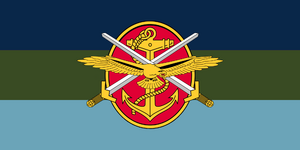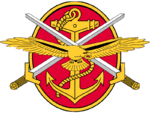Meridon Defense Forces
| Meridon Defense Forces | |
|---|---|
 Triservice flag of the Meridon Defense Forces | |
 Emblem of the Meridon Defense Forces | |
| Founded | 06 May 1739 |
| Service branches | |
| Leadership | |
| President | Yui Townley |
| Defense Secretary | Jason Meritt |
| Chief of Defense Staff | ADM Benjamin Collins |
| Personnel | |
| Active personnel | 870,000 |
| Reserve personnel | 150,000 |
| Expenditure | |
| Percent of GDP | 3.4% |
| Industry | |
| Domestic suppliers | List
|
| Related articles | |
| History | Military history of Meridon List of wars involving Meridon |
| Ranks | Army ranks and insignia Navy ranks and insignia Air Forces ranks and insignia |
The Meridon Defense Forces are the military services of Meridon.
The Commander-in-Chief of the Armed Forces is the President of Meridon, while the seniormost ranking officer is known as the Chief of Defense Staff. The Armed Forces are divided into three services; the Meridonian Army, the Meridonian Navy, and the Meridonian Air Forces.
As of 2020, the Meridon Defense Forces number around 870,000 active troops and 150,000 reserve personnel, which are all part time and professionally trained members of the Defense Force. Conscription into the Defense Forces was mandatory for all males aged 18-28 from 1934-1960, but the force has been able to sustain enough volunteer personnel to maintain its strength. The President, with consent of the Federal Council, reserves the right to enact conscription as needed.
History
See also: Military history of Meridon
Structure
The Meridon Defense Forces is overseen and lead by the Defense Department, who is headed by a civilian Defense Secretary. The senior military leadership of the three services is vested in the joint Defense General Staff, which consists of the service's three senior leaders and advisors from the combatant command.
Branches
Army
Main article: Meridonian Army
The Meridonian Army is the land warfare component of the Meridon Defense Forces. It is composed of TBD active duty troops, and about TBD reservists as of 2022, and is the largest service branch in the Meridon Defense Forces. It is a highly developed and modernized force organized around high levels of mobility and expeditionary capability, including rapid deployment both domestically and regionally.
Main article: Meridonian Navy
The Meridonian Navy is the naval warfare component of the Meridon Defense Forces. It is composed of TBD active duty sailors, and about TBD reservists as of 2022. It operates a number of aircraft and a number of naval vessels, making it the number largest navy in the world. It is a blue water navy and operates aircraft carriers, submarines, amphibious warships, and other support vessels. The Navy also contains the Regiment Marines Commando, which is the elite naval infantry force of the Meridon Defense Forces.
Air Forces
Main article: Meridonian Air Forces
The Meridonian Air Forces is the aerial warfare component of the Meridon Defense Forces. It is composed of TBD active duty airmen, and about TBD reservists as of 2022. It operates a number of aircraft, making it the number largest airforce in the world. It is a multi-spectrum airforce with large transport capabilities and a sizable combat air force.
Military Areas of Responsibilities
Tri-service commands
Joint Special Forces Group (JSFG)- Combatant command supervising all special forces group.
Joint Forces Command (JFC)- Command and operational group coordinating large, complex multi-service operations, exercises, or other such military activities.
Joint Strategic Forces (JSF)- Command and control organ for all units responsible for operating nuclear weaponry, including Air Forces strike wings and land-based missile squadrons; and Navy ballistic missile submarines.
Defense Intelligence Office (DIO)- Defense Department level organization specializing in military intelligence.
Defense Material Control Office (DMCO)- Department-level supervisory for joint-service supply and material.
Personnel
Budget
Procurement
Weapons of Mass Destruction
Meridon is a nuclear weapons state, and operates a full nuclear triad including road-mobile, silo-based, submarine and air-launched missiles operated by the Air Forces and Navy. Meridon has operated nuclear weapons since at least 1956 when it conducted its first test.
Meridon is known to have used chemical weaponry in its past, but has since destroyed all stocks of its chemical and nerve agent weaponry, having been verified by international inspectors in 1988. Meridon maintains a small chemical weapons research program that is primarily utilized for research for force protection.
Meridon has never utilized biological weaponry, but similarly to its chemical weapons program, it maintains a small program that assists in researching defense and prevention of biological weaponry.